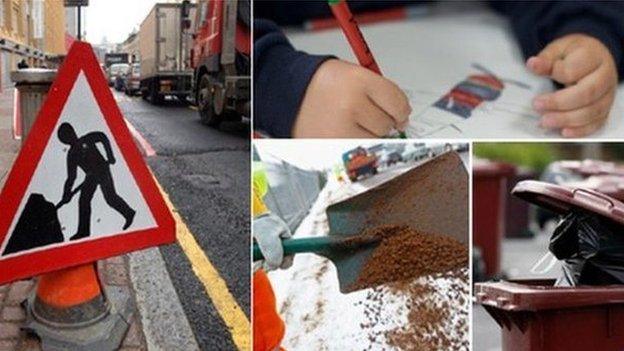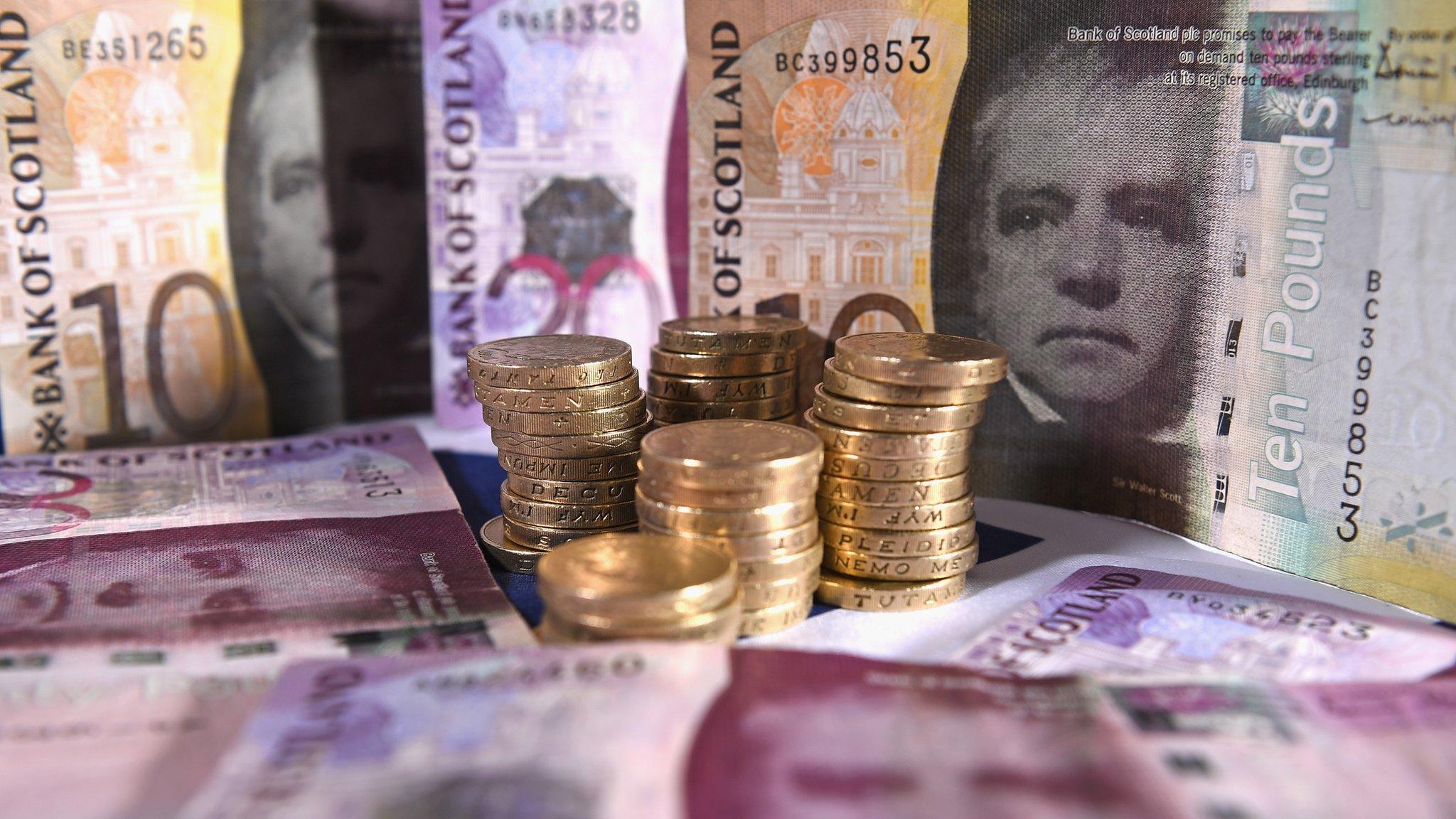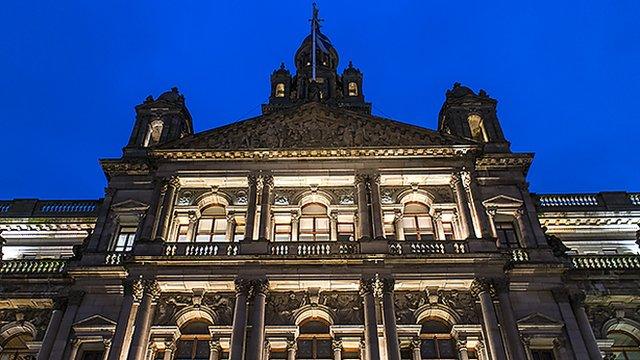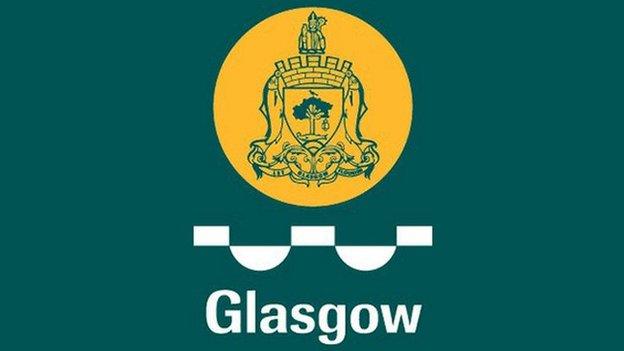Glasgow City Council faces further £100m of cuts and savings
- Published

Glasgow City Council expects 3,000 staff to leave naturally by 2017 as part of cost-cutting moves
Scotland's largest council may need to make a further £100m of cuts and savings in the next two years.
Glasgow City Council officials said it may need to cut spending by 7%. The predicted savings targets are some of the toughest the council has faced.
Glasgow expects up to 3,000 staff to leave naturally by 2017 but said there would be no compulsory redundancies.
The City of Edinburgh Council is to consider savings plans which could result in the loss of 1,000 posts.
Meanwhile Highland Council is also warning it will have to find fresh savings.
In a memo to staff, Highlands chief executive Steve Barron said it would need to save £46m over the next three years - £13m more than originally anticipated.
Mr Barron said the "immediate concern" was that £21m will need to be saved next year.
The Scottish government said it was committed to protecting public services and local government budgets.
The Glasgow budget figure is only a forecast - the council will not know for sure how much money it will have next year for several months.
The council hopes to try to save as much as possible without actual cuts to services the public will notice - that could mean continuing to reduce the number of staff and finding different ways to work with its suppliers and other partners such as charities.
The single biggest cost for councils is staff and wages. It expects about 3,000 staff to leave through natural wastage over the next two years. It believes it could make big savings if as many posts as possible go unfilled.
Poverty and deprivation
BBC Scotland understands it is unlikely at this stage that the council will look for widespread voluntary redundancies and early retirements. Its policy of no compulsory redundancies will remain in force.
Speaking on BBC Radio Scotland's, Good Morning Scotland programme, the leader of Glasgow City Council Gordon Matheson said the local authority faced "great challenges", but that a plan was in place.
He said: "If we more efficiently run our services, like for example using technology more effectively, using our back office by reducing issues like duplication and so on, by altering work patterns, that is the way in which you can reduce budgets without impacting on services.
"We are ahead of the curve. We're forecasting the challenges and we've got a strategic plan for dealing with them."
The council leader denied he was setting out his stall for future council tax rises.
"This is not a game," he said.
"The council tax generates something like 15% of the income that I spend and to be honest I'm more interested in the other 85%, plus the billions of pounds that is spent elsewhere across the public sector.
"The truth is that when you look at the figures, local government has taken a disproportionate cut in our budgets but I'm not on here to whinge."
The financial forecast for Glasgow is contained in a paper prepared for councillors that said the council's main priorities - such as promoting economic growth and looking after its vulnerable citizens - should continue.
It also set out some of the big investment projects due in the coming years that reflect this.
Tax freeze
These include the refurbishment of the Burrell Collection, creating a scheme to recycle food waste across the city and setting out the future of the city's library service.
Another priority is to try to do more to tackle poverty and deprivation.
In the past three financial years, Glasgow City Council has faced savings of between £20m and £30m, though in 2011 it had to save almost £60m.
The prediction comes as the debate continues on the future of local government finance across Scotland.
As a general rule, the total amount of money councils have in their budgets has remained static or increased.
There are two main reasons why cuts and savings are needed: the impact of inflation and the expected rise in demand for individual services.
The council tax has been frozen nationally since 2007 - the terms of the freeze make it all but impossible in practice for a council to raise the council tax.
If they did raise it they would lose some government funding, so the rise would need to be significant before it would actually add significantly to their finances.
A commission set up by the Scottish government is currently looking at what are described as "fairer alternatives" to the council tax.
Some in local government believe the debate should also look at whether councils should have a far greater degree of financial freedom. This could mean having a number of fiscal powers to raise a greater proportion of their own budget so they were far less dependent on the Scottish government.
'Bigger workloads'
Despite several years of austerity, many councils have managed to avoid headline-grabbing cuts to the most popular local services. Instead, the impact has often been more indirect or localised.
Unions argue that many council services across Scotland have suffered so-called "stealth cuts" as budgets have been squeezed and remaining staff have faced bigger workloads.
In many parts of the country, councillors have rejected, delayed and even reversed the most controversial proposals for direct cuts to services - sometimes in the face of strong local protests.
One of the biggest rows over cuts in Glasgow happened two years ago when the council decided to close three day care centres.
There are also signs that Glasgow City Council is having to play hardball over money.
Seventy workers in the council's Homeless Service have been on strike for more than two months in a dispute over their pay grade.
The Scottish government - which currently receives all its money from Westminster - argues it has done its best to protect local government from cuts and that the council tax freeze has been a real help to family budgets.
Glasgow currently receives the largest overall council funding in Scotland and the highest funding per head of all mainland councils.
In the 2012 council elections, Labour said it would maintain the council tax freeze in Glasgow.
Local Government Minister Marco Biagi said: "All councils, including Glasgow City Council and The Highland Council receive a fair share of the total local government settlement of over £10.85bn, with extra money for new responsibilities including the pre-school entitlement and free school meals.
"Scottish Ministers believe the current local tax system is unfair - that's why we have worked with our local government partners to freeze the council tax for the eighth consecutive year, providing £70m per annum.
"All 32 councils have confirmed the continuation of the council tax freeze for 2015-16. We have now set up the cross-party Commission on Local Tax Reform to examine fairer alternatives to the current system, which will deliver its independent report in the autumn."
- Published18 June 2015

- Published5 March 2015

- Published19 February 2015

- Published30 October 2014
